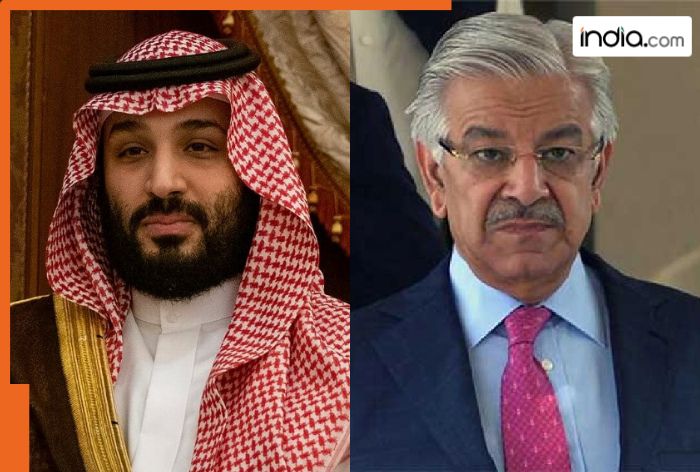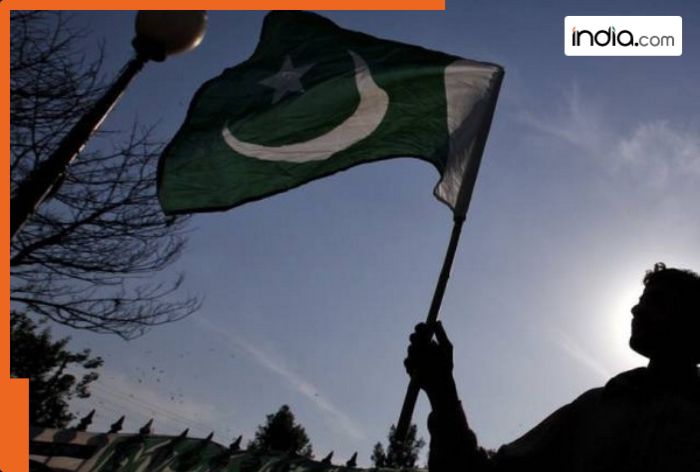Amid mega defence pact with Mohammed bin Salman, Pakistan’s Defense Minister Khawaja Asif makes BIG statement, says, ‘Nuclear…Saudi to…’
Pakistan's Defense Minister Khawaja Asif has made a BIG statement about its nuclear program. Read the details here.

Bankrupt Pakistan is reportedly willing to “rent out” its nuclear weapons. According to Pakistani Defense Minister Khawaja Asif, under a recent defense agreement, Pakistan’s nuclear program ‘will be made available’ to Saudi Arabia if necessary. Asif’s remarks are essentially an acknowledgment that Saudi Arabia has effectively received Pakistan’s nuclear umbrella. His comments came this week following a mutual defense cooperation agreement signed by Pakistani Prime Minister Nawaz Sharif and Saudi Crown Prince Mohammed bin Salman.
When was the defense pact with Saudi Arabia signed?
The remarks made by Defense Minister Khawaja Mohammad Asif emphasize the significance of the agreement reached this week by Saudi Arabia and Pakistan, who have had military ties for decades.
The agreement was inked during a state visit by Pakistan Prime Minister Shehbaz Sharif on Wednesday to Riyadh at the invitation of Crown Prince and Prime Minister of Saudi Arabia Mohammed bin Salman bin Abdulaziz Al Saud. Saudi Arabia and Pakistan have signed a “Strategic Mutual Defence Agreement”, pledging that any aggression against either nation would be treated as an attack on both.
Who will have access to Pakistan’s nuclear capabilities? What exactly does the defense pact between Pakistan and Saudi Arabia entail?
An Associated Press (AP) report, citing analysts, suggests that this move sends a signal to Israel, which has long held the title of the Middle East’s only nuclear power. The timing of the agreement is significant as it comes on the heels of an Israeli strike last week in Qatar against Hamas leaders, which killed six and introduced fresh security concerns among the Arab Gulf states. As a result, some Arab nations are now viewing American security guarantees with increased skepticism.
Khawaja Asif, in an interview with Pakistani broadcasting company Geo TV on Thursday, was asked if Pakistan’s nuclear deterrence capabilities might become available to Saudi Arabia. Asif responded, “Let me make one point clear about Pakistan’s nuclear capability: that capability was established long ago when we conducted tests. Since then, we have forces trained for the battlefield.” Later he added,”What we have, and the capabilities we possess, will be made available to (Saudi Arabia) according to this agreement.”
The defense deal between Pakistan and Saudi Arabia, which was signed on Wednesday, declares that an attack on one nation would be an attack on both.
The agreement states that “any aggression against either country shall be considered an aggression against both,” said the statement issued by both sides. “This agreement, which reflects the shared commitment of both nations to enhance their security and to achieving security and peace in the region and the world, aims to develop aspects of defence cooperation between the two countries and strengthen joint deterrence against any aggression,” it added.
The International Atomic Energy Agency (IAEA) has not yet responded to the statement made by the Pakistani defense minister regarding their nuclear capabilities. During the interview, Asif criticized Israel for not informing the IAEA about its alleged nuclear weapons program.
STORY HIGHLIGHTS
- The defense deal between Pakistan and Saudi Arabia was signed on Wednesday.
- It declares that an attack on one nation would be an attack on both.
- Saudi Arabia has had a longstanding relationship with Pakistan’s nuclear program.
- Saudi Arabia and Pakistan have signed a “Strategic Mutual Defence Agreement”.
Saudi Arabia has had a longstanding relationship with Pakistan’s nuclear program. Retired Pakistani Brigadier General Feroz Hasan Khan told the AP that Saudi Arabia had been “generous financial support to Pakistan that enabled the nuclear program to continue, especially when the country was under sanctions.” Over the years, Pakistan faced U.S. sanctions for its pursuit of nuclear weapons.
What's Your Reaction?




















































